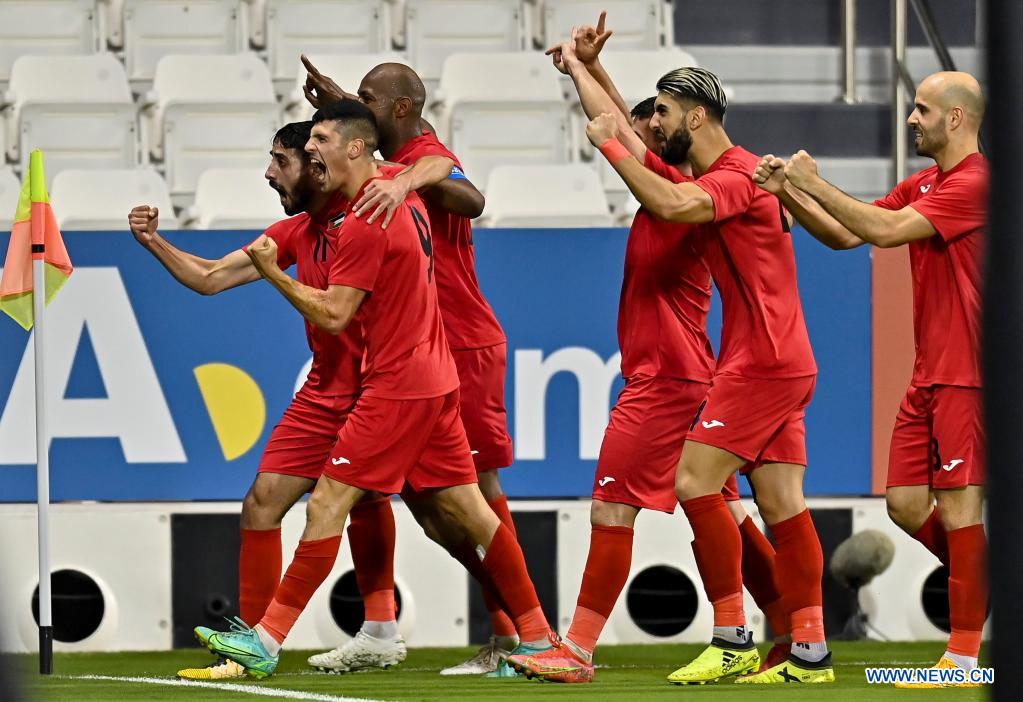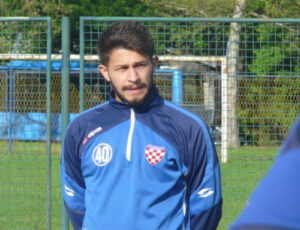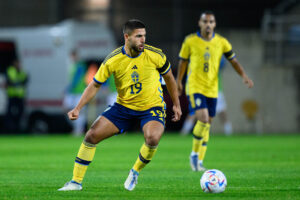As mentioned earlier this week, you can almost guarantee that eight out of the eleven players who demolished Yemen and Philippines in Asian Cup qualification will start Palestine’s first game of the 2023 Asian Cup in a yet to be determined Australian/Indonesian/Korean/Qatari city next June.
Rami Hamadi has 20 clean sheets to his name and has only conceded 24 goals in 35 starts with the national team. Musab Al-Battat, Mohammed Saleh, Yaser Hamed Mayor are automatic starters for their clubs in Egypt and Qatar.
Mohammed Rashid just earned his big move to Egypt further continuing his ascendancy in world football.
Mohammed Yamin and Tamer Seyam might play in the WBPL but have earned their stripes after a years of convincing performances with the national team.
Oday Dabbagh needs no introduction.
A tiny player pool
Makram Dabboub simply has not had the time to build out a pool of players he trusts. His first matches as the national team manager were in June 2021 and he has only had two friendlies to during his time at the helm.
In an interview following the successful 2023 Asian Cup qualifying campaign- Dabboub highlighted this as one of the biggest problems he faced and part of the problem why Palestine struggled at the FIFA Arab Cup.
Over the past 14 months a mere 36 players have played for Palestine over the course of 11 matches. The majority of those players on the fringes have played themselves out of consideratiton as opposed to the opposite. So in the coming months, it will be of the upmost importance to get foreign based players into camp and on the pitch in real games to assess what they can provide the national team going forward.
No games for Olympic Team
The Under 23 team who might have a couple of players ready to make the jump to the senior team is also out of action. The PFA decided not to send a team to the Islamic Solidarity Games in Konya and with the Asian Games delayed by a year there will be precious little time to test and integrate a new generation of players.
Keep in mind that Palestine’s U23 team qualifying for the 2018 AFC U23 Asian Cup and playing in the 2018 Asian Games four years ago provided the stage for several players to state their case for the full senior team. At the 2019 Asian Cup Mohammed Rashid and Oday Dabbagh played meaningful minutes while Ahmed Qatmish and Saado Abdelsalam made the preliminary squad. Michel Termanini also featured in three matches in 2018.
Players born between 1999 and 2001 should be the reserve options to this team but at this time of writing we have do not know how ready the likes of Mohammed Sandouqa, Hamed Hamdan, Jamal Hamed, Ali Abu Alfa, and Khalid Nabris are for international football. The notable exception of this generation is Badr Moussa but more players of this type need to get exposure now ahead of the next World Cup qualifying cycle. The other young guns who made up part of the Asian Cup qualifying squad- Nicolas Zedán and Joaquín Abdala- hardly play for their clubs in Chile.
As such it becomes even more important for the U20 team which includes the aforementioned Sandouqa and Nabris to qualify for the U20 Asian Cup next month. That competition- due to be held in March 2023- might provide a breeding ground for a couple of these mercurial talents to make the jump.
Three question marks in defence
Defensively, there are three questions that need answering. Who is Rami Hamadi’s backup? Who will play left back? and who will provide depth at the centerback position.

As far as the first question is concerned. It’s anyone’s guess. Maybe the rumors of John Pulskamp joining the team are true. Perhaps Amr Kaddoura will be given a reprieve. Maybe Toufic Ali continues to capitalize on the fact that he’s nearly two meters tall. Who knows?
As for the team’s starting left back. I think Qatmish played himself out of consideration and that was one of the reasons why he didn’t feature with the national team during qualifying. The official reason was that no WBPL players- outside of those with extended seasons due to Hilal Al-Quds’ and Shabab Al-Khaleel’s AFC Cup campaigns- would be called up.
So it comes down to the Hilal duo of Samer Jondi and Mohammed Khalil. The former actually plays left back at club level and recovered from a poor first half against Mongolia to play an instrumental role in wins over Yemen (5-0) and Philippines (4-0).
As for centreback. I think you can pencil in Michel Termanini’s name as the third choice which would leave Abdelatif Bahdari as the fourth choice CB. Past that there are no real contenders which makes injury or loss of form.
Who will replace Nazmi Albadawi in midfield?
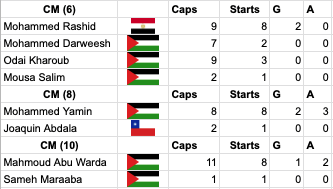
There was a brief moment in 2019 where it seemed that Palestine had found its midfield maestro for the forseeable future. His sudden retirement last year leaves Palestine with a conundrum. There are no obvious replacement in the WBPL or in the ranks of the national team. With Makram Dabboub shifting the formation from a 4-2-3-1 to a 4-3-3 the two way ability means a more complete player is needed besides presumptive starters Mohammed Rashid and Mohammed Yamin. This means that Sameh Maraaba has more than likely played his last game for the national team.
So far, Makram Dabboub has reformatted Mahmoud Abu Warda and while he has enjoyed success in the role there are question marks as to how we might hold up against tougher opposition. The diminutive dynamo brings a superlative amount of energy to the game but that sometimes results in rash tackles and yellow cards. His ejection against Yemen during the Noureddine Ould Ali administration serves as a bitter reminder to fans of the national team.
The #8 position is the exclusive ownership of Mohammed Yamin who has been adding goals to his game in Dabboub’s formation. There is no established backup and it seems unlikely Joaquín Abadala can make that position his own without consistent game time. Any alternative will probably come in the form of an uncapped player.
The deepest position, relatively speaking, in midfield is the #6 where Palestine has two players who you would not hesitate fielding against the biggest teams in Asia. Mohammed Darweesh has the experience and Mohammed Rashid has improved steadily since making his debut in 2018- earning a move to Smouha SC in Egypt as a result.
Behind both is Odai Kharoub who is a capable- if unspectacular- deputy.
Complementary players needed in attack
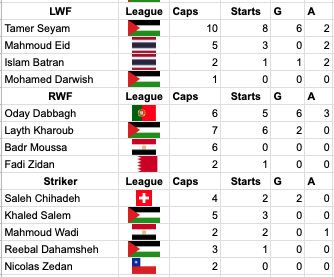
Oday Dabbagh and Tamer Seyam will start the opening game of the 2023 Asian Cup. They’re production has skyrocketed under Makram Dabboub and the two Jerusalemites have fostered an understanding amongst themselves as well as the midfielders tasked with providing them service.
While Palestine does not have an established #9 they have no shortage of options- a far cry of where this team was less than a decade ago. That said, Makram Dabboub has only had the services of Saleh Chihadeh and Mahmoud Wadi for a handful of games. The other #9s seem to have been given a chance due to a slew of absences from the national team. Khaled Salem is gone. Reebal Dahamshe scored 7 goals in 10 games in the Israeli third tier after the Arab Cup but won’t be considered unless he returns to the WBPL. Nicolas Zedán has played 88 minutes total this season.
The names that should make their way into consideration are a trio of players playing abroad: Shehab Qombor, Yashir Islame, and Khaled Al-Nabris are producing at club level but have one senior cap between them since 2019.
Dabboub’s most consistent reserve option is Layth Kharoub. His religious adherence to instructions has resulted in him finding the back of the net with regularity with the national team. In terms of ability, it is hard to make the case for this 31 year old WBPL lifer to play meaningful minutes at the next Asian Cup.
The rest of the field is a mixed bag. Badr Moussa has featured most prominently when healthy and figures to be involved next summer should he continue producing for El-Entag El Harby in the Egyptian second division. Dabboub likes Islam Batran and perhaps he has the inside track into a spot on the Asian Cup squad should he preform well in Thailand. Mohamed Darwish would need to cement a place with his club, something he failed to do with Shabab Al-Khaleel earlier this year. Mahmoud Eid might have lost the confidence of the coaching staff following an ineffective showing at the FIFA Arab Cup.
Who is going to the 2023 Asian Cup?
Is there anyone else other than eight players mentioned that should be making plans to go to the Asian Cup next year?
Let’s keep in mind that formulating a 23 or 26 man squad is not an exact science. Even with five substitutions the chances are that many players may not play a single minute of the tournament. It’s important to have characters in the dressing room who can accept that and still show up to train and help their colleagues prepare. In a pinch those players also need to have the mentality to step up when needed.
I think the likes of Musa Farawi, Abdelatif Bahdari, and Michel Termanini will be on that plane when the time comes. I also think the fact that Samer Jondi plays every game for Hilal Al-Quds as a left back means he will also make the trip. As mentioned earlier, Mohammed Darweesh has the unique combination of experience and ability and can spell Mohammed Rashid capably. Mahmoud Wadi and Saleh Chihadeh are two huge talents who you would take a chance on despite less than ideal circumstances. The hope is that Chihadeh stays sharp despite playing in the fourth tier of Switzerland and that Mahmoud Wadi can get some more consistent playing time- either at Pyramids or somewhere else.
That still only brings us to 15 players. With an opportunity for two goalkeepers and nine outfield players to force their way into the squad.

